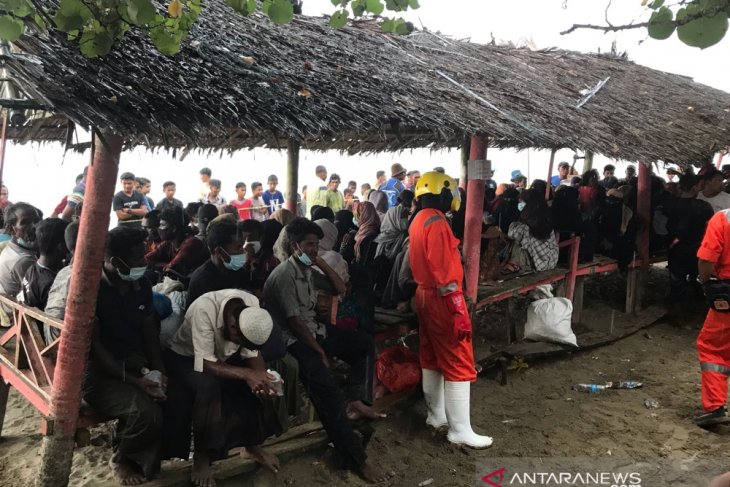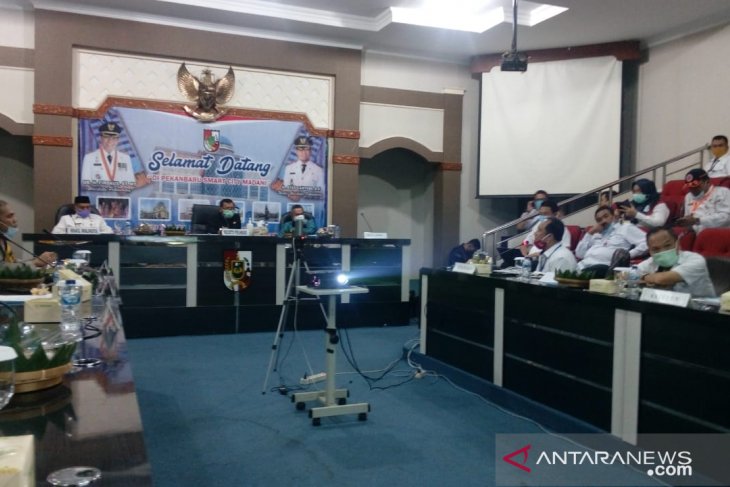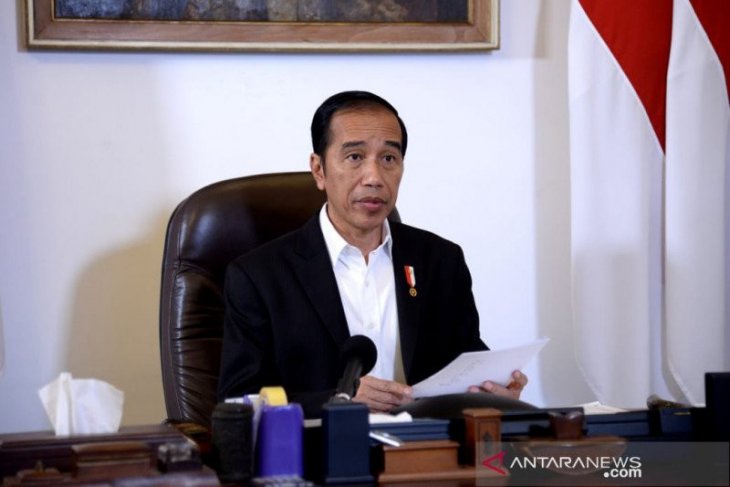Live Streaming
Program Highlight
Company Profile

Ani Hasanah
June

Vendors of the Pondok Bambu traditional market, East Jakarta, queue for swab tests on June 2, 2020. ANTARA/HO-Puskesmas Duren Sawit
The capital city Jakarta added 213 new COVID-19 cases and 68 recoveries, but there was no new death on Saturday.
The capital city's COVID-19 tally reached 10,853 people, up by 213 from 10,640 cases on the previous day, Dwi Oktavia Tatri Lestari Handayani, Head of the Disease Prevention and Control Division of the Jakarta Health Office, said here on Saturday evening.
The total number of COVID-19 patients recovering reached 5,610 people, compared to 5,542 people on Friday, while the death toll remained at 632.
As many as 1,355 patients were undergoing treatment at hospital, and 3,256 people were doing self-isolation at home.
"The number of people under monitoring (ODP) is 26,342 people, and patients under supervision (PDP) is 17,481 people," she said.
Until June 26, 2020, a total of 283,137 samples have been examined with Polymerase Chain Reaction (PCR) tests to trace COVID-19 cases in five regions of Jakarta, notably East Jakarta, West Jakarta, South Jakarta, North Jakarta and Seribu Islands.
A total of 227,323 people have undergone rapid tests with a confirmed COVID-19 case percentage at four percent, or 7,952 people, while 219,371 people were declared nonreactive.
Jakarta imposed Large-Scale Social Distancing (PSBB) measures from April until June 3, 2020. Starting from June 4 until late June, the capital city has been implementing a transitional PSBB ahead of ushering in the new normal.
During the transitional period, several malls and amusement centers and tourist attractions have been allowed to reopen under stringent health protocols, which prescribe measures such as maintaining physical distance, wearing face masks, washing hands frequently, and spraying disinfectants. (ANTARA)
June
 The Coalition of Civil Society Organizations has praised the local people and Government of North Aceh for their initiative and lead in rescuing Rohingya refugees in distress at sea on Thursday (June 25).
The Coalition of Civil Society Organizations has praised the local people and Government of North Aceh for their initiative and lead in rescuing Rohingya refugees in distress at sea on Thursday (June 25).
It is not the sole responsibility of the local government and community to extend assistance to the 99 Rohingya refugees in Punteut, Lhokseumawe, but others, especially those from the national government too should come forward in this endeavor.
The involvement and coordination of other elements, in particular, the national government, are the pressing need of the hour.
The newly arrived Rohingyas, mostly comprising vulnerable women and children, were shifted to a former immigration office building that earlier served as a temporary refugee shelter.
After being adrift at sea since June 22, they were rescued by local fishermen and brought to land following pressing calls from locals. They were taken to the shelter in the late afternoon from Lancok Village, some 15 kilometers from Lhokseumawe. As part of the COVID-19 health protocols, all underwent rapid testing for which the results came non-reactive.
It is not the first time that Rohingyas had arrived in Indonesia and their arrival numbers have shot up since the 2015 conflict in Myanmar that resulted in several of them fleeing their homes.
With the government initially reluctant to help, the local community took it upon itself to step up efforts and taken the rescue task into its own hands while abiding by the prevailing law on solidarity and helping those in distress. The Acehnese had earlier too taken the lead in supporting Rohingya refugees.
The 36th ASEAN Summit, currently underway, is expected to offer the necessary momentum for ASEAN leaders to urge Myanmar to resolve and put an end to crimes against humanity that continue unabated in the country, based on recommendations of the United Nations and the UN Security Council Resolution, as issued by the UN Independent International Fact-Finding Mission on Myanmar.
ASEAN member states must not turn a blind eye to Rohingya refugees whose lives are at risk at sea.
ASEAN member states should prioritize the upholding of human rights, including refugee rights, so that the ASEAN Summit may serve as a summit for collaboration and dialog, not only for economic development but also for the humanitarian crises, democracy, and justice in the Southeast Asian region.
The respect, protection, and fulfillment of human rights, including of refugees, are contained in numerous international conventions, particularly the 1951 UN Refugee Convention.
Indonesia, despite not being a party to the 1951 Convention, has ratified the Presidential Regulation No.125 of 2016 on the handling of refugees from overseas that specifically outlines the assistance and management of refugees, including the provision of shelters.
Indonesia has also ratified several international human rights instruments that should be respected and fulfilled.
Hence, the Coalition of Civil Society Organizations recommends the Indonesian government to urgently implement Presidential Regulation No. 125 of 2016 and issue technical regulations and clarifications where necessary to ensure effective coordination for the management and humane treatment of refugees.
While civil society remains committed to supporting humanitarian efforts, full implementation of the regulation is yet to be effusively achieved, especially owing to the lack of clarity and obstacles faced in government budgeting.
In addition, the coalition has encouraged the Indonesian government to immediately become a party to the 1951 Convention by accession, so that it can be more comprehensive and efficient in protecting the rights of refugees in line with the commitments outlined in the international conventions.
"Issue additional technical guidelines, including quarantine mechanisms, tests, and the implementation of physical distancing to ensure the safety and health of the community and the refugees in response to the COVID-19 pandemic," according to a statement.
The government has called on to immediately determine a more adequate shelter for the refugees since the current shelter, which is an unused immigration office, lacks several necessary facilities. The shelter built by NGOs for refugees in North Aceh has been re-used as an in-patient accommodation for COVID-19 patients. All other options should be taken into account, including the shelter facilities in Langsa.
"Provide access to inclusive, sustainable, and efficient solutions for Rohingya refugees, including for men and women to seek a livelihood while in Indonesia," the statement noted.
The coalition also sought a resolution to the prolonged abuses and denial of rights in Myanmar and engage more proactively with resettlement countries to encourage them to fulfill their commitment to the resettlement of refugees and asylum-seekers in third countries.
"Take into account important lessons from the Rohingya response in Aceh in 2015 where civil society and humanitarian organizations collaborated with the government to fill in much-needed assistance. This is in line with Indonesia’s commitment to Sustainable Development Goals and the Global Compact on Refugees," the statement noted. (ANTARA)
June
 The Pekanbaru city government officials evaluated the third phase of enforcement of large-scale social restrictions on May 27, 2020 . (ANTARA/Vera Lusiana)
The Pekanbaru city government officials evaluated the third phase of enforcement of large-scale social restrictions on May 27, 2020 . (ANTARA/Vera Lusiana)
Some 40 businesspersons and residents in Pekanbaru, Riau Province’s capital, received warning letters from the city administration's public order agency (Satpol PP) for violating preventive measures necessitated under the government's COVID-19 protocols.
Hoteliers and owners of amusement centers were among the businesspersons found violating the COVID-19 protocols, Chief of the Pekanbaru City Public Order Agency Agus Pramono noted in a press statement received by ANTARA in Jakarta, Saturday.
The warning letters were sent since they failed to provide handwashing facilities to their customers. They also did not remind their visitors to practice physical distancing measures and wear face masks during the enforcement of the transitional period towards a "new normal".
"We monitor the business entities that have received our warning letters. If they overlook the warnings, their business permits will be revoked. The citizen identity number (NIK) of individuals found violating the COVID-19 protocols will be blocked," he cautioned.
Pramono called on Pekanbaru’s residents to adopt a disciplined approach in applying preventive measures mandated by the COVID-19 protocols to break the chain of the ongoing coronavirus pandemic.
As of June 26, Indonesia has had 51,427 confirmed COVID-19 cases since the government officially announced its first confirmed cases on March 2, according to the Indonesian Ministry of Health as reported by spokesman for COVID-19 handling Achmad Yurianto.
Of the total number of confirmed cases, 21,333 were discharged from hospitals, while 2,683 others succumbed to the deadly virus.
Coronavirus infections initially surfaced in the Chinese city of Wuhan at the end of 2019.
Since then, COVID-19 has spread to over 215 countries and territories, including 34 provinces of Indonesia, with a massive spurt in death toll.
The Indonesian government officially confirmed the country's first cases on March 2 this year. The COVID-19 pandemic is undeniably a huge crisis in human history that has caused a global economic crisis.
Indonesian President Joko Widodo (Jokowi) stated on Thursday that several nations were bearing the brunt of the ongoing global novel coronavirus disease (COVID-19) pandemic.
The International Monetary Fund has projected several countries to experience an economic contraction this year.
The US economy was forecast to contract up to minus eight percent, while those of Japan, the UK, France, Italy, Spain, and Germany would decline to -5.8 percent, -10.2 percent, -12.5 percent, -12.8 percent, - 12.8 percent, and -7.5 percent respectively. (ANTARA)
June
Documentation of President Joko Widodo (Jokowi). (ANTARA/HO-Presidential Press Office/Lukas/am/sw)
President Joko Widodo (Jokowi) drew attention to two key issues during the virtual 36th ASEAN Summit on Friday held to discuss economic revival in the post-pandemic era and regional cooperation.
"The president of the Republic of Indonesia, in his remark, brought up two main issues, with the first pertaining to the importance of the ASEAN to strengthen cooperation concerning the acceleration of ASEAN's economic recovery," Minister of Foreign Affairs Retno Marsudi stated at the Presidential Palace in Bogor after the high-level meeting.
Jokowi reiterated the declining economic growth owing to the COVID-19 outbreak while also delivering the latest IMF report on revising the world's economic growth to -4.9 percent, from -3 percent as announced earlier, Marsudi added.
With the pressing need for the ASEAN to work together, the head of state noted that connectivity on goods as well as service and economic agents shall soon be boosted.
"The ASEAN should begin preparations on the 'ASEAN travel corridor' thoroughly, measurably, and gradually, starting from 'the essential business travel corridor' that aligns with the stringent health protocols," Marsudi remarked.
Moreover, Jokowi spoke of boosting digital connectivity to broaden the implementation of e-commerce, e-heath and e-learning, including increasing access for the micro, small, and medium enterprises entering the digital platforms.
"Furthermore, President Jokowi highlighted that the signing of the RCEP (Regional Comprehensive Economic Partnership) this year will hold strategic significance for economic recovery as well as offer a momentum to reinforce economic resilience in the region after COVID-19," Marsudi elaborated.
Marsudi noted that the second aspect was regionalism as a form of deeper cooperation in the ASEAN.
The minister emphasized that the "ASEAN-led mechanism" aims to mobilize regional stability and peace during the new normal era. Concurrently, Indonesia's initiative of the ASEAN Outlook on the Indo-Pacific shall be strengthened on the basis of the inclusive, cooperation, rules-based order, and confidence-building principles. (ANTARA)


